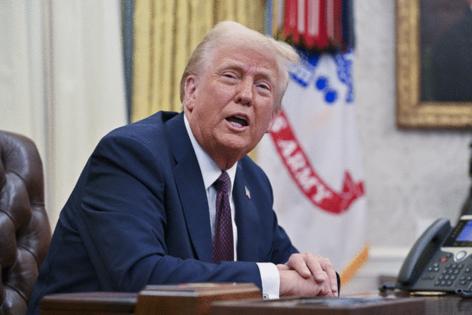Trump floats 'substantial' China tariff cuts in trade deal
Published in News & Features
President Donald Trump said he plans to be “very nice” to China in any trade talks and that tariffs will drop if the two countries can reach a deal, a sign he may be backing down from his tough stance on Beijing amid market volatility.
“It will come down substantially but it won’t be zero,” Trump said Tuesday in Washington, following earlier comments from Treasury Secretary Scott Bessent that the standoff was unsustainable. Trump added that “we’re going to be very nice and they’re going to be very nice, and we’ll see what happens.”
Trump also said he didn’t see the need to “play hardball” with Chinese leader Xi Jinping and that during discussions he wouldn’t raise Covid-19 — an issue that is politically sensitive in Beijing. The White House recently launched a website that suggested the virus came from a lab in China, irking the nation’s diplomats.
Separately, the Wall Street Journal reported details of a plan that White House officials are weighing that would see those tariffs reduced. Officials are considering a proposal with a tiered approach that would see 35% levies on items not considered a threat to national security but at least 100% on those that are, eased in over five years, the Journal reported. One White House official told the paper that the result would be an overall China tariff roughly between 50% and 65%.
A White House official said Trump wasn’t considering unilaterally lowering tariffs, but could do so in concert with discussions with the Chinese that the administration is hoping to jump start.
Foreign Ministry spokesman Guo Jiakun said “the door for talks is wide open,” at a regular press briefing in Beijing on Wednesday, reiterating that trade wars don’t have any winners. While Trump has repeatedly sought to get Xi on the phone, China wants the two sides to work out the contours of an agreement before the leaders speak.
Chinese stocks traded in Hong Kong closed 2.1% higher on optimism that tensions with the U.S. may soften, while the offshore yuan was last up 0.2% versus the dollar.
Trump’s comments come as U.S. stocks and Treasuries have been battered since he rolled out sweeping tariffs on April 2, later announcing a 90-day reprieve for most nations. The 145% duties Trump has placed on Chinese shipments this year remain in place, though he’s made exceptions for computers and popular consumer electronics.
“Trump is panicking due to the markets plummeting and still very high U.S. Treasury yields,” said Alicia Garcia Herrero, chief Asia Pacific economist at Natixis. “He needs a deal and quick. China does not need to offer anything big in such circumstances.”
Xi still hasn’t spoken to Trump since his U.S. counterpart returned to office, with no public indication that talks between the world’s largest economies are taking place, even at lower levels.
Beijing has instead been intensifying its outreach to other countries, even warning them not to strike trade deals with the U.S. that hurt Beijing’s interests. During a meeting with Azerbaijan’s President Ilham Aliyev on Wednesday, Xi reiterated that tariff wars undermine the rights and interests of all countries.
Foreign Minister Wang Yi told his counterparts in the U.K. and Austria that China’s stance toward the U.S. aims at not only “safeguarding its own interests, but protecting international rules and multilateral trade system.” China’s premier, Li Qiang, reportedly wrote a letter to Japanese Prime Minister Shigeru Ishiba this week, calling for a coordinated response to Trump’s tariffs.
The Chinese media outlet Cailian called the U.S. president’s latest remarks “a sign Trump is already softening stance on his signature tariff policies.” Trump “chickening out” was among the top trending topics on China’s Weibo social media website on Wednesday.
China had indicated earlier this month it wants to see a number of steps from the Trump administration before agreeing to any discussions, especially reining in disparaging remarks by members of his Cabinet. Beijing had earlier expressed displeasure with comments Vice President JD Vance made about “Chinese peasants,” with one diplomat calling them “ignorant and disrespectful.”
Bessent told a closed-door investor summit that the world’s two largest economies will have to find ways to de-escalate, which would come in the near future. He also said that it was not the U.S.’s goal to decouple from China, according to people who attended the session.
Still, the Treasury chief said a comprehensive deal could take two to three years to hammer out. He also reiterated his view that China has stifled its consumer economy and favored manufacturing at the U.S.’s expense, saying that any agreement would require a rebalancing of trade that allowed the U.S. to increase manufacturing.
Negotiations with China over such a deal haven’t started yet, he said.
Beijing has sent People’s Bank of China Governor Pan Gongsheng, his deputy, Xuan Changneng, and Finance Minister Lan Fo’an to Washington, which this week will host meetings of the World Bank Group and International Monetary Fund. That could create an opening for top Chinese and American officials to exchange views and open the door to trade talks.
Also, one key member to the Chinese team that will negotiate with the Trump administration was likely put in place last week, when Li Chenggang was appointed vice commerce minister and trade envoy.
Henry Wang Huiyao, founder of the Center for China and Globalization research group in Beijing, said Li’s appointment showed “China is ready to talk,” and Trump’s comments signaled a “more reasonable” tone.
“I’m sure this would get a response from China, so hopefully we’ll have a stabilizing, cooling period and we can continue our relationship as normal as possible with President Trump,” Wang said.
---------
With assistance from James Mayger, Fran Wang, Alan Wong, Shikhar Balwani and Iris Ouyang.
©2025 Bloomberg L.P. Visit bloomberg.com. Distributed by Tribune Content Agency, LLC.







Comments